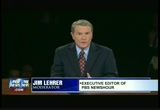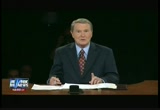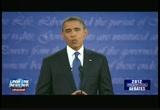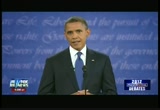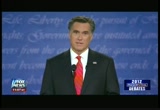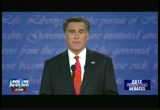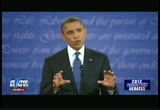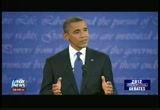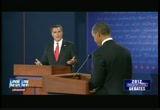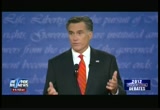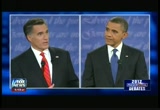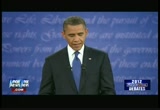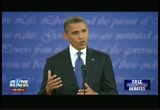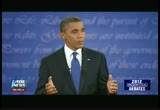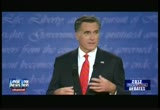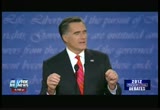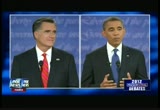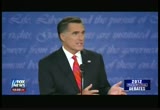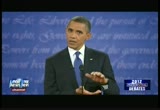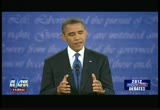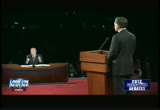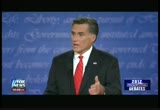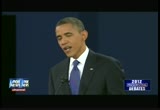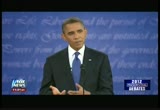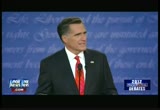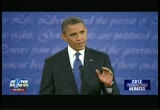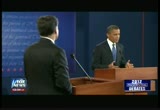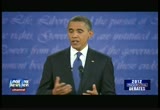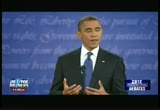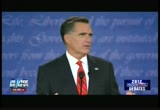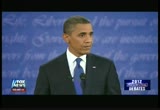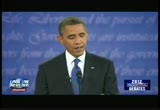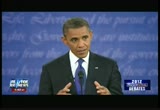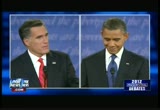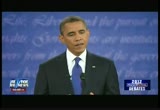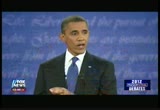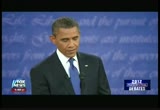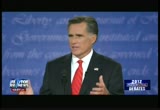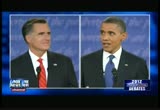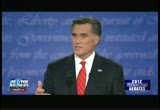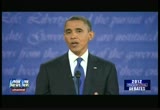tv Stossel FOX News October 7, 2012 1:00am-2:00am EDT
1:00 am
quality and purity standards. and that's why i trust nature made. nature made the number one pharmacist recommended letter vitamin brand. learn more at naturemade.com >> the first faceoff between president obama and governor mitt romney about to stt the first face-off between president obama and governor romney about toer start in just seconds right here live at thee university of denver. welcome. i'm may giimmay againim. >> i'm meg gin kelly. >> i'm bret baier. >> bring in chris wallace. we are told theol audience here is evenly divided among democrats, republicans and university students. they have been asked to keepbu quiet. what coucan we expect on the se tonight. in. >> i talkedto to campaign t
1:01 am
officials and seems clear two battles tonight. one is over the state of the economy right now. obama is going to say that he has made a lot of progress bute basically going to ask for mor. time to finish the job. t the romney camp says this is where their guy is going to be tough on obama's record in the economy over the last four years and he will say barack obama made a lot of promises in 2008 and hasn't kept the promises. they don't worry about their are guy being likeable and say the key is to stay on offense. the other battle over the plans for the next four years where o obama will be tough on romney and say this is a guy who wants to give tax cuts to the wealthc and to voucherrize medicare. romney will say he is the defender of the middle class. t both sides say this could get heated tonight. >> chris, thank you. >> good evening. >> we go to jim lehrer of pbs moderating this debate. >> i'm jim lehrer and welcome you to the first of the 2012l presidential debates between
1:02 am
president barack obama the democratic nominee and former, massachusetts governor mitt romney the republican nominee. this debate and the next three, two presidential, one vice presidential, are sponsored byo the commission on presidential debates. tonight's 90 minutes will be about domestic issues and will follow a format designed by the commission. there will be six roughly 15 minute segments with two minutt answers for are the first question and then open discussion for the remainder o. each segment. o thousands of people offered suggestions on segment subjects or questions via the internet and other means.. but i made the final selections and for the record, they were not submitted for approval tomi the commission or theates candidates. the segments as i announced in advance will be three on the economy and one each onro healthcare, the role ofan government and governing.
1:03 am
with an emphasis throughout onc differences specifics, and choices. both candidates will also have two minute closing statements. s promised to remain silent. no cheers, applause, boos, hisses, among other noisy, distracting things, so we may all concentrate on what the candidates have to say. there is a noise exception right now, though, as we welcome president obama... and governor romney. [cheers and applause]
1:04 am
>> reporter: gentlemen, welcome to you both. >> gentlemen, welcome to you both. let's start the economy, seth one and let's begin with jobs. what are the major differences between the two of you about how you you go about creating new jobs?w you have two minutes. each have two minutes to start. a coin toss has determined, mr. president, you go first. >> thank you very much, jim, yu for this opportunity. i want to thank governor romnek and university of denver for your are hospitality. there are lot of points i wantr to make tonight but the most important one is that 20 years ago i became the luckiest man on earth because michelle obamt agreed to mary me and i just want to wish sweety, you happyd anniversary and let you know that a year from now we will not be celebrating it in front of 40 million people. people. four years ago, we went through
1:05 am
the worst financial crisis since the great depression. millions of jobs were lost. the auto industry was on the brink of collapse. the financial system had frozen up. and because of the resilience and the determination of the american people, we have begun to fight our way back. over the last 30 months, we have seen 5 million jobs in the private sector created. the auto industry has come roaring back. and housing has begun to rise. but we all know that we have still got a lot of work to do. so the question here are a perspective that says if we cut taxes, skewed toward the wealthy and roll back regulations that we will be better off. i have a different view. i think we have to invest in education and training. i think it's important for us to develop new sources of energy, here in america, that we change our tax code to make sure that we are helping small businesses
1:06 am
and companies that are investing here in the united states. that we take some of the money we are saving as we wind down two wars, to rebuild america. and that we reduce our deficit in a balanced way that allows us to make these critical investments. now, it ultimately will be up to the voters, to you, which path we should take. are we going to double down on the top-down economic policies that helped to get us into this mess? or do we embrace a new economic patriot. >> that says america does best when the middle-class does best. i am alonging ford that debate. >> reporter: governor romney, two minutes. >> thank you, jim. it's an honor to be here with you. and it's an honor to be here with the president. i appreciate the welcome of the university of denver and the presidential commission on these debates. congratulations to you, mr. president, on your anniversary. i am sure this is the most remantic place you can imagine -- here with me. congratulations. this obviously is a very tender
1:07 am
topic. i had the occasion over the past couple of years of meeting people across the country. i was in dayton ohio, and a woman grabbed my arm and said i have been out of work since may. you can help me? yesterday in a rally in denver, a woman came up with a baby in her arms and said, ann, my husband had had four part-time jobs in four years. he has los its his most recent job and we have lost our home. you can help us? the answer is yes, we can help. but it will take a different pact, not the one we have been on, not the one the president describes as a top of it down, cut-taxes for the rich, that's noting what i am going to do. my plan will get us energy dependent, that creates 4 million jobs. number 2, open up more trade, particularly in latin america, crack down on china if and when they cheat. number 3, make sure our people have the skills they need to succeed and the best schools in the world. we are fwar away from that now.
1:08 am
number 4, getitous a balanced budget. number 5, champion small business. it is small business that creates the jobs in america. over the last four years, small business people have decided that america may not be the place to open a new business because new business startups are down to a 30-year low. i know what it takes to get small business growing again, to hire people. now, i am concern that the path we are on has been unsuccessful. the president has a view very similar to the view he had when he ran four years ago, that a bigger government, spending more, taxing more, regulating more -- if you will, trickle-down government would work. that's not the right answer for america. i will restore the vitality that gets america working again. thank you. >> reporter: mr. president, please respond directly to what the governor just said about trickle-down? the trickle-down approach, as he said yours is. >> let me talk specifically about what i think we need to do.
1:09 am
first, we have to improve our education system. and we have made enormous progress drawing on ideas both from democrats and republicans that are already starting to show gains in some of the toughest-to-deal-with schools. we have a program, race to the top that has prompted reforms in 46 states around the country, raising standards, improving how we train teachers. so i want to hire another 100,000 new math and science teachers. and create 2 million more slots in our community colleges so that people can get trained for the jobs that are out there right now. and i want to make sure that we keep tuition low, for our young people. when it comes to our tax code, governor romney and i both agree that our corporate tax rate is too high. so i want to lower it, particularly for manufacturing, taking it down to 25%. but i also want to close those loopholes that are giving incentives for companies that are shipping jobs overseas, i want to provide tax breaks for
1:10 am
companies that are investing here in the united states, on energy, governor romney and i both agree, we have to boost american energy production. and oil and natural gas production are higher than they have been in years. but i also believe that we have to look at the energy source of the future, like wind, solar and bio-fuels and make those investments. so all of this is possible. now, in order foritous do it, we to have to close our deficit. one of the think thises i am sure we will be discussing is how do we deal with our tax code and make sure we are reducing spending in a responsible way and have the revenue to make the investments. this is where there is a difference because governor romney's central economic plan calls for a $5 trillion tax cut, on top of the bush tax cut, which is $twenty one trillion and $2 trillion in additional military spending that the military hasn't asked for. that's $8 trillion. how we pay for that, reduce the
1:11 am
deficit and make the investments we need to make without dumping those costs onto middle-class americans i think is one of the central questions of this campaign. >> reporter: both of you have spoken about a lot of different things. we are going to try to get through them in as specific a way as we possibly can. first, governor romney, do you have a question you would like to ask the president directly about what he just said? >> i would like to clear up the record and go through it piece by piece. i don't have a $5 trillion tax cut. i don't have a tax cut of the scale you are talking about. my view is that we ought to provide tax relief to the middle class. but i am not going to reduce the hair of taxes of high-income people. they are doing just fine. they will do fine whether you are president or i am. the people who are having a hard time right now are middle-income americans. on the other hand the president's policies, middle americans are, crushed. middle americans have seen their income come down by $4,300. this is a tax in and of itself,
1:12 am
i will call at this time economy tax. it's been crushing. the same time gasoline prices have doubled under the president, electric rates are up. food prices are up. health care costs have gone up $2500 a family. middle-income families are being crush the. so the question is how to get them going again. i have described it -- it's energy and trade, training programs, balancing the budget and helping small business. those are the cornerstones of my plan. the president mentioned a couple of ideas. first, education. i agree, education is key, particularly to the future of our economic economy. but our training programs, we have 47 house in the federal government, reporting to 8 agencies, overhead is overwhelming. we have to get the dollars back to the states and go to the workers so they can create their own pathways to get the training they need for jobs that will really help them. the secondary, taxation, we agree, we ought to bring the tax realities down, i do, both for corporations and for individuals. but in order to not lose
1:13 am
revenue, and have the government running the money, i lower deductions and credits and exemptions to take in the same money when you account for growth. the third area, energy. energy is critical. and the president pointed out correctly that production of oil and gases in the u.s. is up. but not due to his policies. in spite of his policies. mr. president, all of the inies in -- the increase in natural gas and oil is on private land, not government land. on government land, your administration has cut the number of permits and licenses in half. if i am president, i will double them. i will also gets the oil from offshore and alaska. i will bring that pipeline in from canada. by the way, i like coal. i want to make sure we can continue to burn clean coal. people in the coal industry think it's getting crushed by your policies. i wanted to get america and north america energy independent to create jobs. finally with regards to the tax cut. look, i am not looking to cut
1:14 am
massive taxes and reduce the revenues going to the government. my number 1 principle is no tax cut that adds to the deficit. no tax cut that adds to the deficit. but i want to reduce the burden being paid by middle-income americans. to do that, that means, i cannot reduce the burden paid by high-income americans. any language to the contrary is simply not accurate. >> reporter: mr. president? >> i think, let's talk about taxes because i think it's instructive. four years ago when i stood on this stage, i said that i would cut taxes for middle-class families. and that's exactly what i did. we cut taxes for middle-class families by about $3600. and the reason is because i believe that we do best when the middle class is doing well. by giving them those tax cuts, they had a little more money in their pocket, to maybe buy a new
1:15 am
car. they are certainly in a better position to weather the extraordinary recession we went through. they can buy a computer for their kid, going off to college, which means they are spending more money, businesses have more customers and make more profits and hire more workers. now, governor romney's proposal that he has been promoting for 18 months calls for a $5 trillion tax cut on top of $2 trillion of additional spending for our military. and he is saying that he is going to pay for it by closing loopholes and deductions. the problem is that he has been asked over 100 times how you would close the did you ductions and loopholes and he hasn't been able to identify them. but i am going to make an important point here, jim. >> reporter: all right. >> when you add up the loopholes and deductions that upper-income individuals can -- are currently taking advantage of, you take those all away, you don't come close to paying for $5 trillion in tax cuts and $2 trillion in additional military spending.
1:16 am
that's why independent studies looking at this said the only way to meet governor romney's pledge of not reducing the deficit -- or not adding to the deficit is by burdening the middle-class families, the average middle-class family with children would pay $2,000 more. that's not my analysis. that's the analysis of economists who have looked at this. that kind of top-down economics, where folks at the top are doing well, so the average person making $3 million is getting a $250,000 tax break, while middle-class families are burdened further, that's not what i believe is a recipe for economic growth. >> reporter: all right. let's stay on taxes -- >> right, right. >> reporter: let's stay on taxes -- >> but virtually everything he just said about my tax plan is inaccurate. >> reporter: all right. >> if the tax plan he described were a tax plan i was asked to support, i would say absolutely not. i am not looking for a $5
1:17 am
trillion tax cut. i won't put in place a tax cut that adds to the deficit. that's part 1. no economist can say mitt romney's tax plan adds $5 trillion if i say, i won't add to the deficit with my tax plan. number 2, i will not reduce the share of high-paid income individuals. i know it's a popular thing to say with a lot of people, but it is just not the case. vifive boys. i am used to people saying something that is not always true and keep repeating it and hoping i will believe it. but that is not the case. all right? i will not reduce the taxes paid by high-income americans. number 3, i will not under any circumstances raise taxes on middle-income families. i will lower taxes on middle-income families. you cite a study. six other studies look at the study you describe and say it's wrong. i saw a study that said today you are going to raise taxes $3- to $4,000 on middle-income families. throw the studies out there.
1:18 am
the bottom line is, i want to bring the rates down, at the same time, lower deductions and exemptions and credits and so forth so we keep getting the revenue we need. you thinks, why lower the rates? and the reason is because small business pays that individualerate. 54% of america's workers work in businesses that are taxed not at the corporate tax rate, but at the individual tax rate. and if we lower that rate, they will be able to hire more people. for me, this is about jobs. this is about getting job it's. >> reporter: that's where we started. do you challenge what the governor said about his own plan? >> for 18 months, he has been running on this tax plan. now, five weeks before the election, he's saying his big, bold idea is never mind. and the fact is that if you are lowering the rates the way you describe, governor, then it is not possible to come up with enough deductions and loopholes
1:19 am
that only affect high-income individuals to avoid either raising the deficit or burdening the middle class. it is math. it's arathmatic. governor romney and i do share a deep interest in encouraging small business growth. at the same time that my tax plan has lowered taxes for 98% of families, i also lowered taxes for small businesses 18 times. what i want to do is continue the tax rates, the tax cuts that we put into place, for small businesses and families. but i have said that for incomes over $250,000 a year, that we should go back to the rates we had when bill clinton was president and we created 23 nil lion new jobs and went from deficit to surplus and created millionaires to boot. the reason this is important is that we can not only reduce the
1:20 am
deficit and encourage job growth through small businesses, but we can make the investments that are necessary in education and energy. we do a difference in definitions of small business. under my plan, 97% of small businesses would not see their income taxes go up. governor romney says those top 3%, they are the job creators, they would be burdened. but under governor romney's definition, they are a bunch of millionaires and billionaires are small businesses. donald trump is a small business. i know donald trump doesn't like to think of himself as small -- anything. but that's how you define small businesses, if you are getting business income. that kind of approach, i believe, will not grow our economy because the only way to pay for it without either burdening the middle class or blowing up our deficit is to make drastic cuts in things like
1:21 am
education, making sure that we are continuing to invest in basic science and research, all the things that are helping america grow. i think that would be a mistake. >> reporter: all right -- >> jim, let me come back on that point -- [overlapping dialogue] >> reporter: excuse me. just so everybody understands, we are way over our first 15 minutes. >> that's fine, isn't it? >> reporter: it's okay. it's great. no problem. i don't have a problem with it. we are still on the economy. but we are going to come back to taxes. we are going to move on to the deficit and a lot of other things, too. but go ahead, sir. >> you bet. mr. president, you are absolutely right, which is that with regard to 97% of the businesses are not taxed at the 35% tax rate. they are taxed at a lower rate. but the businesses that are in the last 3% happen to employ half -- half of all the people who work in small business. those are the businesses that employ one-quarter of all the workers in america. your plan is to take their tax rate from 35% to 40%.
1:22 am
now i talked to a guy who has a very small business. he's in the electronics business in st. louis. he has 400 employees. he said he and his son calculated how much they pay, federal income tax, federal state tax, state property tax, gasoline tax tadd up to well over 50% of what they earned. your plan is to take the tax rate on successful small businesses from 35% to 40%. the national federation of independent businesses has said that will cost $700 -- 700,000ions. i don't want to cost jobs. my priority is jobs. and so what i do, i bring down the tax rates, lower deductions and exemption, the same idea behind bowles-simpson, get the rates down, lower deductions and exemptions to create more jobs because there is nothing better for getting us to a balanced budget than having more people, earning more money, paying more taxes, that's the most
1:23 am
effectsive and efficient way to get this budget balanced. >> jim, you may not to move to another topic. i would say this to the american people, if you believe that we can cut taxes by $5 trillion and add $2 trillion in additional spending that the military is not asking for, $7 trillion to give you a sense, over 10 years, that's more than our entire defense budget. and you think closing loopholes and deductions for the well to do, you will not end up picking up the tab, then, governor romney's plan may work for you. but i think math, common sense and our history shows us that's not a recipe for job growth. look we have tried this. we have tried both approaches. the approach that governor romney's talking about is the same sales pitch that was made in 2001 and 2003. and we ended up with the slowest
1:24 am
job growth in 50 years. we ended up moving from surplus to deficits. and it all culminated in the worst financial crisis since the great depression. bill clinton troyed the approach i am talking about. we created 23 million newions, we went from deficit to surplus and businesses did very well. so in some ways, we have some data on which approach is more like lie to create jobs and opportunity for americans. and i believe that the economy works best when middle-class families are getting tax breaks so they have money in their pockets and those of us who have done extraordinarily well because of this magnificent country that we live in, that we can afford to do a little bit more thotomake sure we are want blowing up the deficit. >> reporter: the president began , -- >> i think i get the last word. let me make this comment -- [overlapping dialogue]
1:25 am
>> jim: let -- >> i am not in favor of a $5 trillion tax cut. that's not my plan. my plan is not to put into place any tax cut that increases the deficit. you may keep referring to it as a $5 trillion tax cut. but that's not my plan. let's look at history. my plan is not like anything that has been tried before. my plan is to bring down rates, deductionsductions and credits e same time, so the revenue stays in, but we bring down rates to get more people working. my priority is putting people back to work in america. they are suffering in this country. we talk about evidence. look at the evidence of the last four years. it's absolutely extraordinary. we have 23 million people out of work, or stopped looking for work in this country -- >> jim: all right -- all right. >> when the president took office, 32 million people on food stamps, 47 million on food stamps today. economic growth this year, slower than last year. and last year slower than the
1:26 am
year before. going forward with the status quo will not cut it for the american people, who are struggling today. >> jim: let's talk -- we are still on the economy. this is theoretically now, a second segment, still on the economy. specifically on what to do about the federal deficit. the federal debt. the question, you each have two minutes on this... governor romney, you go first because president went first on segment 1. the question is this: what are the differences between the two of you as to how you would go about tackling the difsit problem in this country? >> i am glad you raised that. it's a critical issue. i think it is not just an economic issue. i think it's a moral issue. i think it's frankly not moral for my generation to keep spending massively more than we take in, knowing the burdens are going to be passed on to the next generation, and they are going to be paying the interest and the principle all of their lives. and the amount of debt at $1 trillion a year is simply not
1:27 am
moral. how do we deal with it? mathematically, there are three ways to cut a deficit. one is to raise taxes. number 2 is to cut pending. number 3 is to grow the economy. because if more people work in a growing economy, they are paying taxes and you can get the job done that way. the president would prefer raising taxes. i understand. the problem with raising taxes is that it slows down the rate of growth. you can never quite get the job done. i want to lower spenning and encourage economic growth at the same time. what would i cut from spending? first of all, i will eliminate all programs by this test, if they don't pass it -- is the program so critical, it's worth borrowing money from china -- obamacare's on the list. i apologize for that term, mr. president. >> i like it. >> i will stop the subsidy to pbs. i like pbs. i like you, too. but i am not going to spend
1:28 am
monothings to borrow money from china to pay for t. number 2, i will take programs that are good programs that if they are run more efficiently at the state level and send them to the state. number 3, i will make government more efficient and cut employees and combine agencies and departments. my cutbacks will be done through atrittion, by the way. this is the approach we have to take to get america to a balanced budget. the president said he would cut the deficit in half. unfortunately, he doubled t. trillion-dollar deficits for the last four years. the president's put in place as much public debt, almost as much as all prior presidents combine. >> jim: mr. president, two minutes. >> when i walked in the oval office. himore than a trillion-dollar deficit greeting me. we know where it came from. two wars that were paid for on a credit card, two tax cuts that were not paid for and a whole bunch of programs that are not paid for.
1:29 am
and then, a massive economic crisis. despite that, what we have said is, yes, we had to take emergency measures to make sure we didn't slip into a great depression. but what we have also said is we are cutting out the things that are not helping us grow. so 77 government programs, everything from aircrafts that the air force had ordered but weren't working very well, 18 government programs for education that were well intentioned but weren't helping kids learn. we went after medical fraud in medicare and medicaid, very aggressively. more than ever before. and have saved tens of billionings of dollars. $50 bill whereon of waste taken out of the system. i worked with democrats and republicans to cut $twenty1 trin out of our discretionary domestic budget. that's the largest cut in the discretionary domestic budget since dwight eisenhower.
1:30 am
we all know we have to do more. i have put forward a specific $4 trillion reduction deficit plan. it's on a web site. you can look at the numbers, what cuts we make and what revenue we raise. the way we do it is $2.50 for every cut, we ask for a dlf additional revenue, paid for, as i indicated earlier, by asking those of us who have done very well in this country to contribute a little bit more to reduce the deficit. governor romney mentioned the bowles-simpson commission. thew -- that's how the bipartisan commission suggested we do it, in a balanced way with some rev new and some spending cuts. this is a major difference that governor romney and i have. let me finish this point, you are looking for contrasts. you know, when governor romney stood on a stage with other republican candidates for the nomination, and he was asked, would you take $10 of spending
1:31 am
cuts for just $1 of revenue? and he said, no. now, if you take such an unbalanced approach, that means you are going to be gutting our investments in schools and education, it means that governor romney talked about med scpaid how we could send it back to the states. but effectively, this means a 30% cut in the primary program we have for seniors in nursing homes, for kids with disabilities, that's not a right strategy to move forward. >> jim: way over the two minutes. >> sorry. >> jim: governor, do you support simpson-bowles. >> the president should have grabbed that -- >> jim: do you support simpson-bowlis. >> in my view -- i have my own plan. the president should have taken it to congress, fight for it -- >> that's what we have done. we are putting it forward before congress right now -- >> you have been president four years. you have been president four
1:32 am
years. you said you would cut the deficit in half. we have trillion-dollar deficits. cbo says we will have a trillion-dollar deficit each of the four years. you have said before, you would cut the deficit in half. i love this idea of $4 trillion in cuts and ways to reduce or get closer to a balanced budget, but we show trillion-dollar deficits every year that. doesn't get the job done. let me say, why is it that i don't want to raise taxes? why don't i want to raise taxes on people? and actually, you said it in 2010, you said, i am going to extend the tax policies i have. i am not going to raise taxes because when the economy's slow and we are in recession, you shouldn't raise taxes on anyone. the economy is still slow. as a matter of fact, it's growing more slowly now than when you made that statement. if you believe the same thing, you don't want to raise taxes on people. the reality is, it is not just
1:33 am
donald trump you are taxing. it is all those businesses that employ one-quarter of the work fwherz america. these small businesses that are taxed as individuals. you raise taxes and you kill jobs. that's why the national federation of independent businesses said your plan will ket kill 700,000 jobs. i don't want to kill jobs in this environment. let me make one more point -- >> jim: let's let him answer the tacks thing for a moment. >> okay. >> well, we have had -- >> jim: about the idea in order to reduce the deficit, there has to be revenue in addition to cuts. >> governor romney has ruled out revenue -- [overlapping dialogue] >> the revenue i get is by more people working, getting higher pay, paying more taxes. that's how we get growth and how we balance the budget. but the idea of taxing people more, putting more people out of work, you will never get there. you never balance the budget by raising taxes. spain -- spain spends 42% of
1:34 am
their total commo government. >> jim: okay. >> we are spenning 42% of our economy on government. i don't wawant to go down the ph to spain. i want to go down the path of growth that puts americans to work with more money coming in because they are working. >> jim: but, mr. president, you are saying, in order to get the job done, it has to be balanced -- >> if we are serious, we have to take a balanced, responsible approach. by the way, this is not just when it comes to individual taxes. let's talk about corporate taxes. now i have identified areas where we can right away make a change that i believe would actually help the economy. the oil industry gets $4 billion a year in corporate welfare, basically, they get deductions that the small businesses that governor romney refers to -- they don't get. now, does anybody think that exxon mobile needs some extra money when they are making money every time you go to the pump?
1:35 am
why wouldn't we want to eliminate that? why wouldn't we eliminate tax breaks for corporate jets? if you have a corporate jet, you can probably afford to pay full freight and not get a special break for t. when it comes to corporate taxes, governor romney has said, he wants in a revenue-neutral way, close loopholes, deductions -- he hasn't identified when ch ones they are -- but thereby bring down the corporate rate. well, i want to do the same thing, but i have identified how we can do that. part of the way to do it is to not give tax breaks to companies that are shipping jobs overseas. right now, you can take a deduction for moving a plant overseas. i think most americans would say, that doesn't make sense at all. so if we take a balanced approach, what that then allows us to do is also to help young people the way we already have during my administration, make
1:36 am
sure they can afford to go to college t. means that the teacher that i met in las vegas -- wonderful young lady -- who describes to me, she has 42 kids in her class. the first two weeks, she has them sitting on the floor until finally, they get re-assigned. they are using textbooks that are 10 years old. that's not a recipe for growth. that's not how america was built. budgets reflect choices. ultimately, we will have to make some decisions. if we are asking for no revenue, that means that we have to get rid of a whole bunch of stuff. and the magnitude of the tax cuts that you are talking about, governor, would end up resulting in severe hardship for people, but more importantly, would not help us grow. as i indicated before, when you talk about shifting medicaid to states, we are talking about potentially, a 30% cut in medicaid over time. now, that may not seem like a
1:37 am
big deal when it just is numbers on a sheet of paper. but if we are talking about a family who has an autistic kid and is depending on that medicaid, that's a big problem. governors are creative, there is no doubt about t. but they are not creative enough to make up for 30% on medicaid. what happens is some people don't get help. >> jim, we have a lot of top beings there. it is going to take a minute to go from medicaid to schools -- oil to tax breaks and comeu companies going ore seas. the department of energy has said the tax break for oil companies is $2.8 billion. it's an accounting treatment in place a hundred years -- >> it's time to end it. >> in one year, you provided $90 billion in breaks to the green energy world. now, i like green energy as l. but that's about 50 years worth of what oil & gas receives and
1:38 am
you say exxon and mobile, this $2.8 billion goes largely to drilling operators and so forth. but if we get that tax rate from 35 to 25%, that $2.8 billion is on the table. that probably won't survive to get the rate to 25 pmpls but don't forget, you put $90 billion, 50 years worth of breaks into solar and wind -- sosolyndra and fisker. you don't pick the winners and losers -- you pick the losers. so this is not the kind of policy you want to have to get america energy secure. the second topic, you said you get a deduction for taking a plant overseas. i have been in business 25 years. i have no idea what you are talking about. i maybe need to get a new accountant. but the idea that you get a break for shipping jobs overseas is simply not the case. what we do have -- i would like to bring money from overseas
1:39 am
back to this country. medicaid to states, i am not sure where this came n. i would like to take the medicaid dollars that go to states and say, you will get what you got last year, plus inflation and plus 1%, then you are going to manage your care near your poor in the way you think best. as a governor when this idea was floated by tommy thompson, the governor it's republicans and democrats -- said please, let us do that. we can care for our own poor, so much better than having the federal government tell us how to care for our poor. so let's -- one of the magnificent things about this country is the whole idea that states are the laboratories of democracy. don't have the federal government tell everybody what kind of training programs they have to have and what kind of medicaid they have to have. let the states do this. and if the states get in trouble, we can find a way to help them -- >> jim: let's go. >> the right approach is one which relies on the brilliance of our people and states --
1:40 am
>> jim: we are going on. still on the economy, but another part of it. all right? this is segment 3, the economy. entitlements. first answer goes to you, 2 minutes, mr. president. do you see a major difference between the two of you on social security? >> i suspect that on social security, we have a somewhat similar position. social security is structureually sound. tell have to be tweaked the way it was by ronald reagan and speaker -- democratic speaker tip o'neill. but the basic structure is sound. but i want to talk about the values behind social security and medicare. and then talk about medicare because that's the big driver of our deficits right now. you know, my grandmother -- some of you know -- helped to mee raise me. my grandfather died a while back. my grandmother died 3 days before i was elected president.
1:41 am
she was fiercely independent, only had a high school education, started as a secretary and ended up being the vice-president of a local bank. and she ended up living alone by choice. and the reason she could be independent was because of social security and medicare. she had worked all her life, put in this money and understood that there was a basic guarantee, a floor under which she could not go. that's the perspective i bring when i think about what is called entitlements. you know, the name itself implies some sense of dependency on the part of these folks. these are folks who worked hard, like my grandplrght and there are millions of people who are counting on this. so my approach is to strengen the system over the long term. in medicare, we said, we are going to have to bring down the costs, if we are going to deal with our long-term deficits. but to do that, let's look at where the money's going, $716
1:42 am
billion, we were able to save from the medicare program, by no longer over-paying insurance companies, by making sure that we weren't overpaying provideirs and using that money, we were able to lower prescription drug costs for seniors by an average of $600. and we were also able to make a significant dent in providing them the kind of preventive care that will ultimately save money throughout the system. so the way for us to deal with medicare, in particular, is to lower health care costs. when it comes to social security, as i said, you don't need a major structural change to make sure that social security is there for the future. >> jim: we'll follow up. first, governor romney, 2 minutes on social security and entitlements. >> well, jim, our seniors depend on these programs. i know any time we talk about entitlements, people become other than concerned that something is going to happen to change their life for the worst. the answer is that neither the president nor i are proposing
1:43 am
any changes for any current retirees or near retirees, either to social security or medicare. so if you are 60 or around 60 or older, you don't need to listen any further. but for younger people, we need to talk about the changes that will be occurring. i thought about one -- that's i was wrong, when i said the president isn't propose anything changes for current retirees. in fact, he is on medicare. on social security, he's not. bow medicare, for current retirees, he is cutting $716 billion from the program. he says by not over-paying hospitals and providers, going on them and saying, we are going on reduce the rates you get paid. everybody's going to get a lower rate, that's not going after abuse, that's saying we are cutting the rates am 15% hospitals and nursing homes say they won't take medicare pates under that scenario. we have 50% of doctor who is say they won't take more medicare patients. we have 4 million people on medicare advantage that, will
1:44 am
lose medicare advantage because of the $716 billion in cuts. i can't understand how you can cut medicare $716 billion for current recipients. you point out, we are putting some back with a bettered prescription program. that's $1 for every $15 you have cut. they're smart enough to know, that's not a good trade. i want to take that $716 billion and put it back into medicare, by the way, we can include a prescription program if we need to improve it. but the idea of cutting $716 billion from medicare to balance obamacare is, in my opinion, a mistake. with regard to young people coming along, viproposals to make sure that medicare and social security are there for them, without any question. >> jim: mr. president? >> first of all, i think it's important for governor romney present this plan that he said will only affect folks in the future. and the essence of the plan is that he would turn medicare into
1:45 am
a voucher program. it's called premium support. but it's understood to be a voucher program -- >> jim: you don't support that? >> i don't. let me explain why -- >> again, that's for future people. not current retirees. >> if you are 54 or 55, you might want to listen because this will affect you. the idea, which was originally present bide congressman ryan, your runningmate, is that we would give a voucher to seniors and they could go out in the private marketplace and buy their own health insurance. the problem is that because the voucher wouldn't necessarily keep up with health care inflation, it was estimated that this would cost the average senior $6,000 a year n. fairness, what governor romney has now said is that he will maintain traditionally medicare alongside it. but there is still a problem because what happens is those insurance companies are pretty
1:46 am
clever at figuring out who are the younger and healthier seniors, they recriewrt them, leaving the older, sicker seniors in medicare. and every health care economist that looks at that time says over time, what will happen is the traditional medicare system will collapse. and then when you have folks like my grandmanager at the mercy of the private insurance system, precisely at the time when they are most in need of decent health care. so i don't think vouchers are the right way to go. this is not my own -- only my opinion, aarp thinks that the savings we obtained from medicare bolster the system, lengthen the medicare trust fund by 8 years, benefits were not affected at all. and ironically, if you repeal obamacare, and i have become fond of this term, "obamacare," if you repeal it, what happens is those seniors are going to be paying $600 more in prescription
1:47 am
care. they will have to pay co-pays for basic checkups to keep them healthier. and the primary beneficiary of that repeal are insurance companies that... are estimated to gain billions of dollars back when they are not making seniors any healthier. i don't think that's the right approach when it comes to making sure that medicare is stronger over the long term. >> jim: we will talk specifically about health care in just a moment. but do you support the voucher system, governor? >> what i supported is no change for current retirees in near retirees to medicare. the president supports taking $716 billion out of this program. >> jim: what about the voucher? >> that's number 1. number 2, for people who are young, i want to make sure that we keep medicare in place for them to allow them to either choose the current medicare program or a private plan, their choice. they get to -- theyville at
1:48 am
least two plans that will be entirely at no cost to them so they don't have to pay additional money or $6,000 -- that's not going to happen. by the way, if the government can be as effect as the private sector and offer premiums as low as the private sector, people will be happy to get traditional medicare or get a private plan. i know my own view is, i would rather have a private plan. i would just as soon not having the government tell me what kind of health care i get. i would rather have an insurance company and fire them if i don't like it and get another plan. we have to have the benefits high for low income and for higher-income people, we will have to lower mystery benefits. we have to make sure the program is there for the long term. by the way, the idea came not from paul ryan or senator widen, a co-author of the bill in the senate, but also it came from bill clinton's chief of staff. this is an idea that has been around a long time. we are saying, hey, let's see if
1:49 am
we can't get competition into the medicare world so people can get the choice of different plans at lower costs, better quality. i unbelievable competition. >> jim if, if i can respond quickly. first of all, medicare has lower administrative costs than private insurance does, which is why seniors are generally pretty happy with it. private insurance has to make a profit. nothing wrong with that. that's what they do. and so, you have higher administrative costs, plus profit, on top of that. and if you are going to save any money through what governor romney's proposing, what has to happen is that the money has to come from somewhere. and when you move to a voucher system, you are putting seniors at the mercy of those insurance companies. and over time ftraditional medicare has decayed or fallen apart, then they're stuck. and this is at this time reason why aarp has said that your plan
1:50 am
would weaken medicare, substantially. and that's why they were supportive of the approach that we took. one last point i want to make, we do have to lower the cost of health care. not just in medicare -- >> jim: we'll talk about that in a minute. >> but overall. >> jim: okay. >> that's a big topic. [overlapping dialogue] >> jim: i want to get to it. very quickly -- >> let's get back to medicare -- [overlapping dialogue] >> the president said the government can provide the service at lower cost. if that's the case it will be the best product people can purchase -- >> jim: wait a minute, governor. >> the private sector is able to provide a better product at a lower cost. >> jim: you can two of you agree that the voters have a choice, a clear choice on medicare? >> absolutely. >> jim: all right. to finish quickly, briefly, on the economy. what is your view about the level of federal regulation of the economy right now? is there too much?
1:51 am
in your case, mr. president, some there be more? beginning with you... this is a two-minute segment. we will go for a few minutes and then go to health care. >> regulation is essential. you can't have a free market work without regulation. as a business person, i had to have -- i needed to know the regulations, i needed them there. you couldn't have people opening up banks in their garage and making loans -- i mean, have you to have regulation so you can have an economy work. every free economy has good regulation. at the same time, regulation can become excessive -- >> jim: is it excessive now? >> in some places. >> jim: like where? let me know. >> it can be out of date. some of the legislation that has been passed during the president's term, you have seen regulation become excessive. it has hurt the economy. let me give you an example. dodd frank was passed, and it includes a number of provisions that i think has some unintended consequences that are harmful to
1:52 am
the economy. one is it designates a number of banks as too big to fail. they are effectively guaranteed by the federal government. this is the biggest kiss given to new york banks i have ever seen. this is an enormous boon for them. there have been 122 community and maul banks have closed since dodd frank. here's one example. here's another -- >> jim: you want to repeal dodd frank? >> i would replace it. we won't get rid of all regulation. some parts of dodd frank make all the sense in the world. you need transparency and leverage limits -- >> jim: here's a specific -- >> let me mention the other one. >> jim: let's not. let's let him respond to this specific on dodd frank and what the governor just said. >> i think this is a great example. the reason we have been in such an enormous economic crisis was prompted by reckless behavior
1:53 am
across the board. now twasn't just on wall street. you had loan officers that were giving loans and mortgages that really shouldn't have been given bos because the folks didn't qualify. hupeople borrowing money to buy a house they couldn't afford. hucredit agencies stamping these as a-1 great investments when they weren't. but you also had banks making money hand over fist, churning out products that the bankers themselves didn't even understand, in order to make big profits, but knowing that it made the entire system vulnerable. so what did we do? we stepped in and had at this time toughest reforms on wall street since the 1930s. we said, banks, you have to raise your capital requirements. you can't engage in the rinky behavior that is putting main street at risk. we are going to make sure that have you to have a living will. so we can know how you will wind things down if you make a bad
1:54 am
bet so we don't have the taxpayer bailouts. in the meantime, we made sure thehelp we provided was paid back, every dng single dime, with interest. now, governor romney has said he wants to repeal dodd frank. i appreciate -- it appears we have agreement that a marketplace to work has to have some regulation. but in the past governor romney has said he wants to repeal dodd frank. roll it back. and so the question is, does anybody out there think that the big problem we had is that there was too much oversight and regulation of wall street? because if you do, then, governor romney is your candidate. but that's not -- what i believe. >> that's not the facts. look, we have to have regulation on wall street. that's why i would have regulation. but i wouldn't designate five banks as too big to fail and give them a blank check.
1:55 am
that's one of the unintended consequences of dodd frank. we need to get rid of that provision. it's killing regional and small banks. let me mention another regulation of dodd frank. you say we were giving mortgages to people who weren't qualified. that's right. that's one of the reasons for the great financial calamity we had. dodd frank correctly said, fee we need to have qualified mortgages. if you give a mortgage that's not qualified, there are big penalties. but they didn't define what a qualified morning was. >> jim: all right. >> it's two years, we don't know what a qualified mortgage is yet. so banks are reluctant to make mortgages, try to get a mortgage. it's hurt the housing market because dodd frank didn't anticipate putting in place the kinds of regulations you have to have. it is not that dodd frank was always wrong. sometimes they didn't come out with a clear regulation. i will make sure we don't hurt the functioning of our marketplace because i want to bring back housing and get good
1:56 am
jobs. >> jim: i think we have another clear difference between the two of you. now, let's move to health care, where i know there is a clear difference. and that has to do with the affordable care act, obamacare. it's a two-minute new segment. and that means 2 minutes each. gufirst, governor romney. you wanted repeal. you want the affordable care act repealed. why? >> i sure do. in part tcomes from my experience. -- it comes from my experience. i was in new hampshire, a woman came to me, she said, i can't afford insurance for myself and my son. i met a couple in appleton, wisconsin, who say we are thinking of dropping our insurance, we can't afford it. the number of small business who is say they are dropping insurance because they can't afford it. the cost of health care is prohibitsive. we have to deal with cost. unfortunately, when you look at obamacare, the congressional budget office has said, tell cost $2500 a year more than
1:57 am
traditional insurance. so it is adding to cost. as a matter of fact, when the president ran for office, he said that by this year, he would have brought down the cost of insurance for each family by $2500 a fumely. instead, it's gone up by that amount. so it's expensive. expensive things hurt families. that's one reason i don't want it. second reason tcuts $716 billion from medicare. i want to put that money back in medicare for our seniors. number 3 tputs in place an unelected board that will tell people what kind of treatment they can can have. i don't like that idea. fourth, there was a survey done of small businesses cros the country, said what's been the effects of obamacare on your hiring plans? three-quarters said tmakes us less likely to hire people. i don't know how the president could come into office, facing 23 million people out of work, rising unemployment, an economic crisis at the kitchen table and spend his energy and passion two
1:58 am
years fighting for obamacare, instead of fighting for jobs for the american people. it has killed jobs. and the best course for health care is to do what we did in my state -- craft a plan at the state level that fits the needs of the state. and then, let's focus on getting the cost down for people, rather than raising it with a $25,000 additional premium. >> jim: mr. president, the argument against repeal? >> four years ago when i was running for office, i was traveling around and having those same conversations that governor romney talks about. it wasn't just that small businesses were seeing costs skyrocket and they couldn't get affordable coverage, even if they wanted to provide it to their employees, it wasn't just that this was the biggest driver of our federal deficit, overall health care costs. but it was family, worried about going bankrupt if they got sick -- millions of families across the country. if they had a pre-existing condition. they might not be able to get coverage at all.
1:59 am
if they did have coverage, insurance companies might impose an arbitrary limit. and so as a consequence, they are paying premiums, somebody gets really sick, lo and behold, they don't have the money to pay the bills because the insurance companies say that they have hit the limit. so we did work on this loongz working on jobs because this is part of making sure that middle-class families are secure in this country. and let me tell exactly what obamacare d. number 1, if you have health insurance, it doesn't mean a government takeover. you keep your own insurance. you keep your own doctor. but it does say insurance companies can't jerk you around and impose arbitrary lifetime limits. they have to let you keep your kid on your insurance plan until you are 26 years old. and it also says that you're going to have to get rebates if insurance companies are
143 Views
IN COLLECTIONS
Fox News Television Archive
Television Archive  Television Archive News Search Service
Television Archive News Search Service 
Uploaded by TV Archive on

 Live Music Archive
Live Music Archive Librivox Free Audio
Librivox Free Audio Metropolitan Museum
Metropolitan Museum Cleveland Museum of Art
Cleveland Museum of Art Internet Arcade
Internet Arcade Console Living Room
Console Living Room Books to Borrow
Books to Borrow Open Library
Open Library TV News
TV News Understanding 9/11
Understanding 9/11

